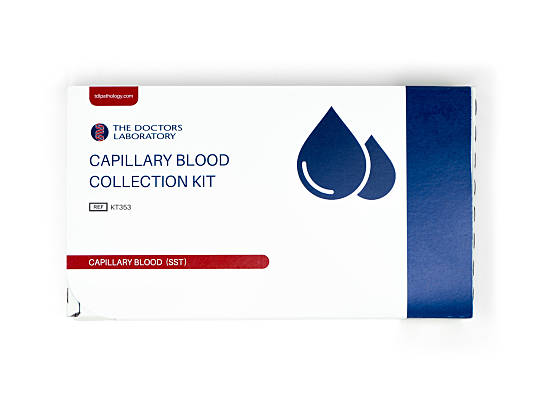At Home Thyroid Function Test Kits
Test your thyroid levels using a home thyroid function test kit with our easy-to-use, fast online service.
Prices from £55.00
Simply fill in a brief questionnaire. One of our doctors will review your order and prescribe a suitable treatment. How to Order
Ordering a kit is quick and simple. You’ll need to complete a short online questionnaire, then order your kit online. Choose to have it delivered to your front door or collect it from your nearest ASDA store.


No results found.
Please check your spelling or try another treatment name.



-
-
A thyroid function test (sometimes called a ‘tft test’) kit checks the levels of thyroid-stimulating hormone (TSH) and thyroxine (T4) in your blood. If your levels are too high or too low, you can then explore getting treatment if required.
The home thyroid function test kit comes with everything you need to take a blood sample:
- blood collection tube
- moist wipe
- alcohol swab
- sample label
- plasters
- lancets
- blood collection tube case
- prepaid return envelope
Your blood sample can then be sent to our partner lab for analysis.
What is the thyroid gland?
The thyroid gland is located in the lower front of your neck, and is butterfly-shaped; made up of two lobes joined by tissue called the isthmus. It works with the pituitary and hypothalamus glands to produce and release T3 and T4 hormones. These hormones have a number of uses in the body, including:
- regulating temperature
- controlling your metabolism (how your body produces energy)
- maintaining your bone and organ health
- setting your sleep patterns
- managing your mood
- handling sex drive
Hyperthyroidism
When the thyroid gland produces too much thyroid hormone, your metabolism will run too quickly. This is called hyperthyroidism, an overactive thyroid, or high thyroid function. If the over-activeness is caused by an autoimmune dysfunction, it’s called Graves’ disease.
Hyperthyroidism can cause:
- anxiety
- hyperactivity
- unexplained weight loss
- swelling of the the thyroid gland (goitre)
Hypothyroidism
If your thyroid gland doesn’t produce enough thyroid hormone, your metabolism will run too slowly. This is called hypothyroidism, an underactive thyroid, or low thyroid function. If an autoimmune dysfunction has caused your thyroid, it’s called Hashimoto’s disease.
Hypothyroidism can lead to:
- feeling tired
- gaining weight
- depression
- sensitivity to the cold
- dry hair or skin
- aching muscles
How do thyroid problems start?
There’s a wide range of causes for both hypothyroidism and hyperthyroidism.
Hypothyroidism (underactive thyroid) can be caused by:
- Hashimoto’s disease
- inflammation of the thyroid
- congenital hypothyroidism (an overactive thyroid at birth)
- surgical removal of all or part of the thyroid
- radiation treatment of the area
- some medication
- too much or too little iodine in your diet
- disorders of the pituitary gland or hypothalamus
Hyperthyroidism (overactive thyroid) can be caused by:
- Graves’ disease
- overactive thyroid nodules
- inflammation of the thyroid
- too much iodine in your diet
- pituitary gland tumours
- an excess of thyroid hormone medication
-
-
Both hypothyroidism and hyperthyroidism are common in the UK. Each of these conditions affect 2% of the population (1 in every 50 people, 4% or 1 in 25 total) during their lifetime.
Testing for thyroid function is a regular part of UK healthcare and is recommended if you experience symptoms of higher or lower thyroid function than normal.
What percentage of the population has hypothyroidism?
Due to differences in diagnosis and thresholds, it’s tricky to compare rates of thyroid disease across countries. Worldwide, it’s estimated that hypothyroidism affects 5% of the population, with a further 5% being undiagnosed.
The most common cause is iodine deficiency, but in areas where there is sufficient iodine, Hashimoto’s disease is the most common cause of underactive thyroid. It’s thought that hyperthyroidism affects between 0.2 and 1.3% of the population in iodine-sufficient parts of the world.
How common hypothyroidism is in the UK: statistics and facts
Around 2% of the British population has hypothyroidism, and it’s ten times more common in women than men. However, some doctors believe that many cases go undiagnosed, and that the actual figure of those with thyroid issues is higher.
Autoimmune hyperthyroidism (Graves’ disease) is the most common form of overactive thyroid in the UK, and accounts for 60-80% of cases, affecting 2% of women and 0.2% of men. It occurs most commonly in women aged 30 to 60 years.
-
-
If you have one or more risk factors or symptoms of thyroid disease, you should consider testing. However, one symptom or risk factor alone may not mean that you need to consider thyroid disease.
Risk factors and symptoms that suggest thyroid testing is a good idea include:
- other autoimmune diseases such as Type 1 diabetes or a family history of auto-immune diseases
- a new case of atrial fibrillation (irregular heart rate)
- unexplained anxiety
- young people with abnormal growth spurts or changes in behaviour
- a swelling in the neck
- high cholesterol levels
- osteoporosis
- fertility issues
- Down’s Syndrome and Turner's Syndrome
- feeling unwell after having a baby
- previous treatment for head or neck cancer
If you’re unsure about your cholesterol levels, you can get cholesterol testing and treatment from Asda.
Why is it important to have your thyroid function tested?
It’s important to have your thyroid function tested because if your thyroid function is working above or below expected levels it can cause a number of health problems. Many of these are treatable, but only if you know what your thyroid function status is.
A diagnosis of a thyroid problem will allow you to get treatment and improve symptoms. In addition, thyroid disorders are associated with long-term health issues. If you have uncontrolled hyper- or hypothyroidism you run a greater risk of developing other conditions, including:
- heart disease
- metabolic disorders
- obesity
- kidney disease
- depression
- anxiety
- problems with pregnancy
What are the symptoms of thyroid problems?
There’s a wide range of symptoms associated with thyroid problems but the presence of 1 does not necessarily mean you have an under or overactive thyroid. Having 2 or more symptoms means it may be worth testing.
Symptoms are different depending on whether you have an overactive or underactive thyroid.
Identifying an underactive thyroid
Symptoms of hypothyroidism (under-active thyroid or low thyroid function) include:
- tiredness
- sensitivity to cold
- weight gain
- constipation
- depression
- brain fog
- slowing down of movements
- muscle aches, cramps and weakness
- dry skin
- brittle hair and nails
- loss of sex drive
- pain, numbness and a tingling sensation in the hand and fingers
- irregular or heavy periods
More serious symptoms can include:
- anaemia
- a hoarse voice
- thinning eyebrows
- a slower heart rate
- hearing loss
Symptoms alone aren’t enough to identify hypothyroidism. The only way to diagnose hypothyroidism is by a blood test that measures hormone levels. If you have a high level of TSH and low T4 you may have an underactive thyroid.
High thyroid levels: symptoms and implications
Symptoms of hyperthyroidism (overactive thyroid or high thyroid function) include:
- nervousness, anxiety and irritability
- hyperactivity
- mood swings
- difficulty sleeping
- fatigue
- heat sensitivity
- muscle weakness
- diarrhoea
- needing to pee more than usual
- persistent thirst
- itchiness
- loss of sex drive
You may also experience:
- weight loss
- twitching
- a swelling in the neck
- an increase in your heart rate
- sweating
- red palms
- a rash or hives
- hair loss and hair thinning
- dry eyes
Having 2 or more of the symptoms of hyperthyroidism could mean you have the condition but you need to have a blood test before you can confirm it.
Recognizing the signs of an overactive thyroid
The only way to diagnose hyperthyroidism is by a blood test that measures hormone levels. This checks the levels of TSH, thyroxine (T4) and, if needed, triiodothyronine (T3). Low TSH and high T3 or T4 mean you have an overactive thyroid. Exact levels depend on your age and testing technique.
If your readings are very high, you may be referred to a specialist for further tests to investigate Graves’ disease and inflammation.
What are the health implications of an overactive thyroid?
If you have long-term, untreated high thyroid function, you run the risk of:
- symptoms that affect your eyes, such as double vision and sensitivity to light
- a thyroid storm, which is a sudden and serious flare-up of symptoms that can cause dehydration and heart problems
- goitres (lumps in your neck)
- high cholesterol and heart problems
- pregnancy complications, including anaemia, pre-eclampsia, birth defects, premature births and stillbirths
-
-
At Asda Online Doctor we provide test kits that let you take a test sample at home and send it off to our partner lab. This sample can be used to test for the two thyroid hormones TSH and T4, which can indicate whether or not you have a function problem.
These are the steps for testing with us:
- Place an order for your test kit
- Receive your test kit at home
- Take your test sample
- Post it to our lab
- Receive results through your patient account, along with advice from one of our doctors
What are the benefits of home testing?
Home thyroid blood test kits provide a number of benefits, including:
- no need to meet face-to-face to take your sample
- no need to make an appointment in advance
- no need to travel to do your test
- you can do your test whenever you like, not just during GP working hours
- fast results just 2 to 3 days after your sample reaches the lab
- comprehensive follow-up advice with your test results
- direct contact with a doctor any time through your patient account
How do I buy a thyroid test kit online?
Buying a thyroid test online from us simple:
- complete a short online questionnaire
- log into your account or create one
- place your order
- your order will be checked by one of our team
- once approved, your test kit will be dispatched
The kit will arrive in discreet packaging and the entire process is totally confidential.
How do our thyroid testing kits work?
Our at-home thyroid function test kits work as both an underactive thyroid test and an overactive thyroid test. Using a one-use lancet (finger pricker), you’ll take a blood sample and send it in the post to a laboratory. There your sample will be checked for levels of TSH and thyroxine (T4).
Your results will be available online 2 or 3 days later. If your levels of TSH or T4 are high or low, you should seek further medical advice; our doctors will advise and support you.
How do you use your home-testing kit?
Follow these steps to use your home thyroid test kit:
- wash your hands with warm soapy water, which will make it easier to collect blood
- dry your hands and clean one fingertip with the medical swab – most people choose the third or fourth finger of their non-dominant hand (the one they don’t write with)
- use the lancet to prick your finger; a small drop of blood should form
- use a clean tissue to wipe away that drop of blood
- use your other hand to squeeze a few drops of blood into the collection tube
- fill the tube to the upper line – if you can’t fill it using one finger then use the lancet on a second finger
- if needed, use a plaster to stop your bleeding
- replace the lid on the collection tube and ensure it’s closed securely
- fill in the label and stick it on the tube
- put the sample tube into the wallet and put that into the prepaid envelope
- send the test kit back from any UK postbox
Your results will be available to view online within 2 or 3 days.
See a copy of instructions that come with your test kit for more information
What are there different types of thyroid tests for?
There are a range of different tests that can be used to check thyroid function and thyroid health, including:
- thyroid function blood tests, like tests for TSH, T4 and T3
- thyroid antibody tests, which check for antibodies that show autoimmune diseases that can affect thyroid function
- ultrasounds, which can check for nodules on the thyroid
- a thyroid scan, which uses radioactive iodine and a special camera to show thyroid nodules that produce too many hormones
- gamma probe test, which also uses radioactive iodine and a probe to check thyroid health
- a biopsy, which involves taking a tissue sample from the thyroid using a needle and testing it
-
-
If you take a thyroid function test at home through Asda Online Doctor, your results will be returned with a detailed explanation and advice on next steps from one of our doctors.
Otherwise, your GP or pharmacist may provide advice on next steps with your results.
Understanding thyroid hormones: what do your results mean?
There are 4 main abnormal results you can get from a combined TSH and T4 test:
- High TSH and low T4 – underactive thyroid
- Low TSH and high T4 – overactive thyroid
- High or low TSH and normal T4 – risk of getting a thyroid problem
- Low TSH and low T4 – possible pituitary gland failure
TSH (milliunits per litre) T4 (picomoles per litre) Normal 0.4 to 4.0
9.0 to 25.0
High Over 4.0
Over 25.0
Low Under 0.4
Under 9.0
-
-
The normal range of test results mean you have no signs of high or low thyroid function, no sign you’re at risk of getting a problem and no possible pituitary gland failure.
Normal results are:
- a TSH level of over 0.4 milliunits per litre
- a TSH level of under 4.0 milliunits per litre
- a T4 level of over 9.0 picomoles per litre
- a T4 level of under 25.0 picomoles per litre
These ranges can be different in some groups of people. Normal thyroid levels in females can be lower in women aged 18 to 29 or they may be different during pregnancy as well.
How quickly will the doctor call with blood test results?
If you choose to buy an ASDA test, your results will be available online via your account within 2 or 3 days. Our doctors can advise what your results mean and what you should do next.
If you visit your regular GP for a test, or get another form of private thyroid test, you will usually need to attend a separate blood test appointment, and it can then take up to a week to get your results. They may not contact you at all if your results are normal and indicate you don’t have any thyroid problem.
How accurate are at-home thyroid tests?
Since Asda’s test kits use a combined test for TSH and T4 they are more accurate than tests that only check for one or the other. Our tests are around 98% accurate overall when the sample is taken correctly, meaning only 1 in 50 tests may be inaccurate.
To make sure your test is accurate, follow the instructions that come with your test kit carefully. This way, your test won’t be affected by a bad blood sample.
What can affect thyroid test results?
Your test results can be affected by a number of different factors, including:
- sample quality – if the sample isn’t take properly or if it gets contaminated it can affect your results
- other health conditions – some health conditions can affect your thyroid hormone levels other than just thyroid disease
- Medications and supplements – like other health conditions, some medications can also affect thyroid hormone levels
Other health conditions that can affect thyroid testing
Health conditions that may affect thyroid test results include:
- heart failure
- certain infections
- trauma
- liver disease
- kidney disease
Medications that can affect thyroid testing
Medications or supplements that can affect thyroid testing include:
- the contraceptive pill,
- steroids
- anticonvulsants
- anti-inflammatory drugs
- lithium (used for certain mental disorders)
- amiodarone (used to control irregularities of the heart beat)
- mineral or vitamin supplements, particularly if the preparation contains iodine or biotin
-
-
You can take your results to your GP or health provider for more advice and to ascertain which treatment will work for you. Alternatively, our doctors can advise you about treatment.
What thyroid treatments are there?
The treatment options available to you will be different depending on whether you have an overactive or an underactive thyroid result.
Underactive thyroid (hypothyroid) treatment
Underactive thyroid function is generally treated using daily hormone tablets called levothyroxine. Levothyroxine, or L-thyroxine mimics the hormone produced by your thyroid and is a generic drug only available in the UK on prescription.
It comes in tablet, capsules and liquid form. If you find you have an intolerance for one brand, another may suit better. You generally start on a low dose, which is gradually increased to suit you. You may feel an immediate effect or you may not see an improvement in your symptoms for a few months.
If your results are borderline or you have very mild symptoms you may not need treatment. A health professional may advise you to make some lifestyle changes, such as:
- exercising more
- eating more healthily
- relaxation and stress management techniques
Overactive thyroid function (hyperthyroid)
Overactive thyroid function symptoms can be treated using beta blockers or tranquillisers such as Propranolol or Diazepam or a combination of the two. These generally have very few side-effects.
If you have an overactive thyroid gland, your doctor may prescribe tablets such as carbimazole or propylthiouracil, which are part of a group of medicines called thionamides. These stop your thyroid producing excess hormones. These medicines can take up to 12-18 months to work, so, in the meantime, you may be given medication to ease your symptoms.
You may find that in time your thyroid levels will come under control, and you can stop taking medicine. However, you may need to keep taking your medication for some years or even for the rest of your life.
Radioactive iodine treatment is effective in over 90% of patients. In most cases, it’s a one-off treatment, where you’re given a drink or capsule that contains iodine and a low dose of radiation. It can take a while for your symptoms to subside, so you may have to take medication until it takes effect.
If other treatments do not work, if you have a lot of swelling in your neck, or if you have severe eye problems, you may be offered surgery. Your thyroid gland will be removed. It is 100% effective, but you will have to take medication (usually levothyroxine) for life.
Diagnosing thyroid cancer
Hyperthyroidism is not a symptom of thyroid cancer, however, studies suggest that there is a link, with somewhere between 1.6% and 21.1% of those with hyperthyroidism having thyroid cancer. However, thyroid cancer is rare.
Symptoms of thyroid cancer include:
- a sore throat
- hoarseness
- lumps in your neck
Thyroid cancer is usually diagnosed through a biopsy, where a tissue sample is taken and cells are tested to see if they’re cancerous.
Why regular thyroid check-ups are essential
If you are diagnosed with an under or overactive thyroid, it might take a while to fine-tune your treatment so that your TSH and T4 levels are stable. NICE guidelines recommend that adults should test every three months until your levels stabilise.
When your TSH and T4 levels are stable, NICE recommends that an adult tests once a year if you still have symptoms, or once every two or three years if there’s no suggestion of underlying thyroid disease.
-
Frequently asked questions
What are the symptoms of thyroid problems in women?
In addition to the normal symptoms of thyroid problems listed in the ‘What are the symptoms of thyroid problems?’ section, women often find that their menstrual cycles can be disrupted and you may even find that your periods stop for a few months (this is also known as amenorrhea).
Periods can stop for a number of reasons, including menopause.
➤ See our menopause test kit service.
What happens if an underactive thyroid is not treated?
If you have long-term, untreated low thyroid function, you run the risk of:
- heart disease
- goitres (lumps in your neck)
- very rarely, a myxoedema coma (extreme drowsiness, hypothermia and confusion)
- pregnancy complications, including anaemia, pre-eclampsia, birth defects, premature births and stillbirths
How do you know if your thyroid is high or low?
Your symptoms may give some idea of whether you have hyperthyroidism or hypothyroidism, but the only accurate way to find out if you have a problem is by taking a test.
What foods should be avoided with thyroid problems?
The British Thyroid Foundation says that there are no foods or dietary supplements that are helpful in treating thyroid disorders. However, they recommend eating healthily:
- five portions of fruit or vegetables every day
- plenty of fibre
- dairy or dairy alternatives
- small amounts of oils and spreads
How to lose weight with an underactive thyroid?
If you have an underactive thyroid it can be difficult to lose weight. However, it helps to eat a healthy diet and exercise regularly. Ask your GP or online doctor for advice. Do not increase the dosage of your medication to try and lose weight as this can cause serious health problems.
➤ See our weight loss treatment service.
Where to get a thyroid test?
You can get a thyroid test at your regular GP surgery, over-the-counter at a pharmacy or online through services like Asda Online Doctor.

Babak studied medicine at King’s College London and graduated in 2003, having also gained a bachelor’s degree in Physiology during his time there. He completed his general practice (GP) training in East London, where he worked for a number of years as a partner at a large inner-city GP practice. He completed the Royal College of GPs membership exam in 2007.
Meet our doctorsLast reviewed: 25 Aug 2023
-
https://www.nhsinform.scot/illnesses-and-conditions/glands/overactive-thyroid [accessed 18th Aug 2023]
-
https://www.nhsinform.scot/illnesses-and-conditions/glands/underactive-thyroid [accessed 18th Aug 2023]
-
https://www.btf-thyroid.org/thyroid-function-tests [accessed 18th Aug 2023]
-
https://www.niddk.nih.gov/health-information/diagnostic-tests/thyroid [accessed 18th Aug 2023]


GMC: 7074021

GMC: 6149061

GMC: 7085115







